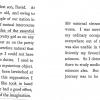5: An antecedent from a previous generation: Excerpts from “Solomon Maimon: An Autobiography,” trans. J. Clark Murray.
Solomon Maimon (1753-1800), was born Shlomo ben Joshua in the town of Zhukov Borok in the Grand Duchy of Lithuania (present-day Belarus). A child Talmud prodigy, as a young man he became increasingly disillusioned and disenchanted with the leadership of the Jewish community and with the religious beliefs and commitments of Jewish tradition. He left his home, abandoning his wife and children, and traveled to Berlin to participate in the intellectual environment of the Enlightenment, eventually becoming the author of a major critique of Kantian philosophy. In his memoirs, which combine philosophical ideas with personal experiences, Maimon chronicles his intellectual path away from Jewish tradition and toward the Enlightenment. His memoirs, modeled on Rousseau’s Confessions, set a pattern followed by many maskilim (followers of the Jewish Enlightenment) who described their development toward rationalism and away from religious tradition. Such memoirs played a central role in the development of modern Jewish literature. In the first excerpt, Maimon describes his lack of preparedness for marriage. In the second excerpt, he describes his decision to leave his community.
Suggested Activities: Have your students discuss the challenges of learning about a culture through informants who have left, discussing the following questions: Both Shulem Deen and Solomon Maimon describe their communities for a readership that is outside of the religious milieu. Do you feel that the authors are respectful of the community and culture they describe? Do you feel that they emphasize certain aspects that their readers might find exotic, funny, or scandalous? In what ways do they represent marital practices similarly, and where do their presentations differ? In reading a negative or unsatisfied review of a culture in a narrative, we should bring at least as much critical awareness to our reading as we would bring to a negative or unsatisfied review of a product on Amazon. How do you think a "satisfied customer" would respond to the portrayals of Deen and Maimon?
Source: Solomon Maimon, Solomon Maimon: An Autobiography, trans. J. Clark Murray. (University of Illinois Press, 2001), p. 79, 187.
maimon.jpg
 Download image (415.9 KB)
Download image (415.9 KB)

